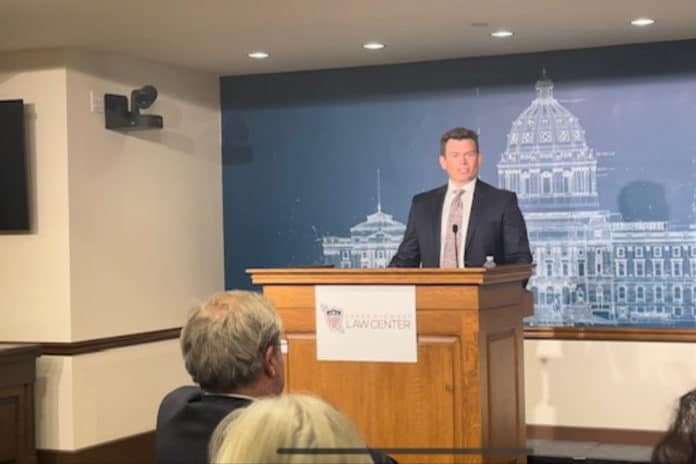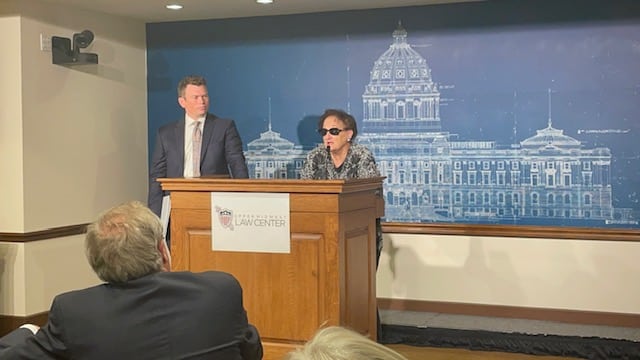
The Minnesota Supreme Court heard arguments Thursday in a lawsuit that claims the Minneapolis City Council and Mayor Jacob Frey violated the law by understaffing the city’s police department.
The lawsuit, filed by eight north side residents in 2020, outlines a city charter requirement which states in part that the council “must fund a police force of at least 0.0017 employees per resident, and provide for those employees’ compensation.”
Last year, Hennepin County Judge Jamie Anderson sided with residents, ordering the city and Frey to “immediately take any and all necessary action to ensure that they fund a police force of at least 730 sworn officers by June 30, 2022.” But a court of appeals reversed that ruling last month. Now it’s up to the state’s high court to decide the fate of the lawsuit.
The most recent data available from the city shows that there are only 621 sworn officers, including 39 on leave. Since the pandemic two years ago and the death of George Floyd, police staffing has plummeted.

Georgianna Yantos, one of the plaintiffs in the case, is pleading with the city to hire more cops to prevent violence. Yantos recalled a “scary” incident last summer in which a group of people with guns chased a man through her backyard. The man was eventually killed down the street where “blood was scattered all over the house.”
“I was told precinct four, which is the precinct I was in, had only two squad cars that were there at the time. That is scary to me,” Yantos said. “But I’ve lived there all my life in Jordan and Hawthorne, and I am not moving. The criminals have to move. We need help from the mayor and from the city. Whatever it takes.”
During Thursday’s oral arguments, Assistant Minneapolis City Attorney Greg Sautter contended that the mayor has discretion over hiring and does not have a clear duty to employ the minimum number of police outlined in the charter. However, he said the City Council does have a duty to provide funding for a minimum number of officers.
“Not included in that language is any requirement to employ a certain number of police officers at a certain level at any point in time,” Sautter told the court.
Upper Midwest Law Center attorney James Dickey, who represents the eight Minneapolis residents, told the media Thursday that “discretion is not an excuse for inaction.”
“The law clearly provides a minimum funding requirement, and as the requirement says, they have to compensate employees with those dollars,” Dickey argued.
Dickey was asked during oral arguments how much the city could reasonably do to reach a staffing level of 731.
“There could be lots of other reasons that they can’t hire the officers. Like lots of officers retiring,” Justice Paul Thissen said.
Dickey acknowledged that workers are more limited than in years past, but he said the city still needs to provide evidence that it has made efforts to reach the minimum number of officers. Plaintiffs in the case want the Supreme Court to reinstate the district court’s order, which asks the city to either hire enough officers or prove why it cannot.
“It creates this kind of due process here,” Dickey said. “Mayor Frey has testified [that] he has tried throughout the last several years to get more money from the City Council for more police officers and the money simply hasn’t been there.”
In that case, the City Council needs to provide more funding, Dickey said.
“But if the City Council has provided enough money, which is kind of insinuated by Justice Thissen and others and by the court of appeals as well in this case, if the City Council has provided enough money in this case and Mayor Frey simply hasn’t taken that money and converted it to officers, well then Mayor Frey needs to be subjected to writ of mandamus,” he continued.
Dickey said it doesn’t matter who is at fault because “all our clients want is to have some semblance of safety and police presence in their neighborhoods because they’re suffering so much.”
If the Supreme Court agrees with the plaintiffs, it could return the case to district court, which could then set a new deadline for increasing staffing.
















